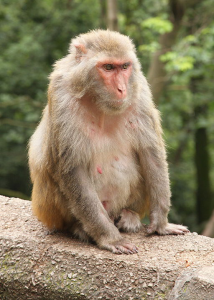
By Einar Fredriksen [CC BY-SA 2.0], via Wikimedia Commons
During the study, the monkeys were trained to recognize a series of patterns. Most were able to learn the short series, but some could not and would often choose the incorrect symbol that should follow after the symbol it was presented. In an effort to determine what caused this problem, the scientists studied the inferior temporal cortex (ITC) of the forgetful monkeys as they grappled to predict the correct symbol. Interestingly, about 25% of the activity in the ITC was attributed to choosing the incorrect answer while more than half was in a different grouping of cells entirely! It would seem that the correct pattern was still being recalled (the neurons for it were firing) even though the monkey “remembered” and acted on the wrong pattern. Their conclusion is that behavior may indicate otherwise, but knowledge is not forgotten.
I am interested in reading the full journal article to see if any conclusions were actually drawn to explain why an incorrect symbol corresponding with lesser neural activity was chosen over the correct symbol. It would seem that this study introduces as many questions as it answers, and that there is a lot of research to be done still.
The full study will be published in the October 20th issue of the journal Neuron.
